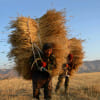Prices of most essentials stable

Ramadan has been a little different this time. Unlike the previous years, prices of most of the essential commodities have remained stable so far, except for fish, red meat and fruits.
The Daily Star found this after visiting six kitchen markets in Dhaka city recently.
Fish prices started going upwards way before the beginning of Ramadan. And the trend has continued weeks into the fasting month because of a “supply shortage”.
At the same time, the prices of beef and mutton soared at the approach of the month, to Tk 550-580 per kg from Tk 480-500 and Tk 800-820 a kg from Tk 700-750 respectively.
Seeing the sudden surge, Dhaka South City Corporation intervened and fixed the price of beef at Tk 525 per kg and mutton at Tk 750 a kg, a day before Ramadan began. During the visits of The Daily Star, most of the butchers were found following the fixed rates.
The good news is the prices of spices (onion, garlic), most pulses and sugar have remained almost stable up till now. Vegetable and chicken prices are, on the other hand, going down.
Chicken prices fell by Tk 20-25 each kilogram. The price of eggplant dropped from Tk 50-80 a kg before Ramadan to Tk 30-60 now. Chickpea got cheaper too, by Tk 5-10 a kg, to Tk 75-85 now.
The visits to the six markets revealed that fish prices have increased by Tk 30 to Tk 100 per kilogram compared to those before Ramadan. The markets are in Jatrabari, Kaptanbazar, New Market, Hatirpool, Karwanbazar and Mohakhali.
“Around 20 days ago, I bought rui fish for Tk 180 per kg. But I had to pay Tk 40 more on each kg today,” said Moinul Hasan, while shopping in New Market area, on May 15.
Shopper Jamil Ahmed reported a similar increase in Mohakhali kitchen market.
He said, “Fish prices may go up in this season when supply drops. But I think Ramadan has left an impact because the hike is too much.
“If I didn’t have to pay extra on fish, I could buy some fruits,” said the gymnasium trainer.
Jamil purchased one kilogram of pabda (butter catfish) at Tk 460 in the Mohakhali market, which is about Tk 60 higher than the price in late last month.
At Jatrabari, medium-size shrimp was selling for Tk 650-700 per kg, which was Tk 550-580 two months ago. River shrimps are much more expensive, at Tk 900-1,100 a kg.
Retailers claimed that fish prices started spiralling in wholesale markets at the start of Ramadan, while wholesalers blamed the rise on poor supply.
However, some buyers alleged that citing a supply shortfall, traders have increased the prices too much centring on the holy month.
Mohammad Shahin, a fish seller in Jatrabari, said they were paying an additional Tk 20 to 40 on each kilogram in the wholesale markets from the beginning of Ramadan.
“If the prices were low in the wholesale market, we would have reduced them here too. Sometimes the supply in the wholesale market is so low that we cannot buy enough fish.”
Nur Islam, a wholesaler in Jatrabari, explained the reason behind poor supply.
During summer, fish farmers dry their ponds before resuming cultivation with fresh rainwater, and this causes a supply deficit, he said.
He hoped that the prices would drop in two or three months.
Another reason is the ongoing bans on fishing, according to traders.
Ramzan Ali, a deputy director of the Department of Fisheries, said this year they are strictly implementing the ban on catching small hilsa (jatka), which will continue till the end of June.
“We’ve imposed another 65-day ban on the catching of marine fish and crustaceans for the greater interest because this is the breeding period for sea fish.”
The ban will be in force from May 20 to August 23.
FRUITS COSTLIER
Meanwhile, the prices of almost all fruits have gone up significantly since late April.
One kilogram of pomelo (malta) is selling for Tk 200-220 and a pineapple for Tk 30-60. The prices were Tk 120-130 and Tk 20-40 respectively about a month ago.
Apple sold at Tk 140-170 per kg before Ramadan. The price is Tk 230-260 now.
A retailer in Mohakhali market, Md Sarwar, claimed that the price of a carton of apple (around 10kg) saw an increase of Tk 400-500 in mid-May. “That’s why we raised the retail price.”
A buyer in Mohakhali, however, alleged that these are all excuses. “Most of us want to have fruits in iftar. Taking advantage of this need, they raised the price disproportionately.”

 For all latest news, follow The Daily Star's Google News channel.
For all latest news, follow The Daily Star's Google News channel. 








Comments